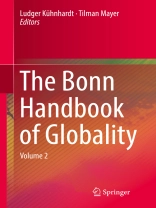This two-volume handbook provides readers with a comprehensive interpretation of globality through the multifaceted prism of the humanities and social sciences. Key concepts and symbolizations rooted in and shaped by European academic traditions are discussed and reinterpreted under the conditions of the global turn. Highlighting consistent anthropological features and socio-cultural realities, the handbook gathers coherently structured articles written by 110 professors in the humanities and social sciences at Bonn University, Germany, who initiate a global dialogue on meaningful and sustainable notions of human life in the age of globality.
Volume 1 introduces readers to various interpretations of globality, and discusses notions of human development, communication and aesthetics.
Volume 2 covers notions of technical meaning, of political and moral order, and reflections on the shaping of globality.
Daftar Isi
V. Aesthetic-Practical Appropriation of the World: Art and Culture.- Aesthetics (Rolf Lessenich).- Archaeology (Bethany J. Walker).- Art (Roland Kanz).- Beauty (Anne-Marie Bonnet).- Cultural change (Reinhard Zöllner).- Cultural memory (Roland A. Ißler).- Culture (Christoph Antweiler).- Dance (Erik Fischer and Alexander Kleinschrodt).- Film (Michael Wetzel).- Founding myths (Michael Bernsen).- Image (Jens Schröter).- Liberal arts and cultural studies (Paul Geyer).- Literature (Christian Moser).- Museum (Karoline Noack).- Music (Bettina Schlüter).- Narration (Barbara Schmidt-Haberkamp).- Reception of antiquity (Thomas A. Schmitz).- Theater (Helmut J. Schneider).- Tradition (Rolf Lessenich).- Travel (Kerstin Stüssel).- VI. Public Order: Politics and Law.- Atlantic civilization (Karl Kaiser).- Constitution (Klaus F. Gärditz).- Democracy (Volker Kronenberg).- Dictatorship (Volker Kronenberg).- Diplomacy (Joachim Scholtyseck and Thomas Freiberger).- Demos (Christian Hillgruber).- Empire (Dominik Geppert).- Europe (Peter Geiss).- Federalism (Hanns Jürgen Küsters).- Governance (Frank Decker).- Law (Mathias Schmoeckel).- Monopoly on the use of force (Stefan Haack).- Nation (Peter Geiss).- Peace (Erich Weede).- Political leaders (Hans-Peter Schwarz).- Power (Matthias Becher).- Regulation (Christian Koenig).- Sanctions (Urs Kindhäuser).- Sovereignty (Matthias Herdegen).- World Order (Christian Hacke).- VII.- Moral Order and Human Mortality: Ethics and Religion.- Cognition (Andreas Bartels).- Community and society (Clemens Albrecht).- Conflict (Marc Laureys and Rolf Lessenich).- Conventions (Doris Mathilde Lucke).- Cosmos (Cornelia Richter).- Ethics (Dieter Sturma).- Eternity and finitude (Michael Schulz).- Freedom, equality, solidarity (Christoph Horn).- Humanity (Marc Laureys and Rolf Lessenich).- Human dignity (Theo Kobusch).- Images of man (Ludger Honnefelder).- Marriage and family (Gerhard Höver).- Meaning of life (Christoph Horn).- Oikos (Heinz Gerd Ingenkamp).- Religion (Michael Schulz).- Rituals (Michael Meyer-Blanck).- Sacred Books (Manfred Hutter).- Time (Dirk Tänzler).- Truth (Michael Schulz).- Values (Hartmut Kreß).- VIII. Shaping Globality.- Is globality shapeable? (Xuewu Gu).- Globality: The point of view of language and literature (Marion Gymnich).- Christianity and other religions in the age of globality (Wolfram Kinzig).- Global turn und cultural perceptions: The example of Islam (Stephan Conermann).- Globality: Cultural comparison between Europe and China (Wolfgang Kubin).- Humanity – Globality – Politics (Tilman Mayer).
Tentang Penulis
Ludger Kühnhardt is a professor of Political Science at Bonn University, Germany. He is also director of Bonn University’s Center for European Studies (ZEI).
Tilman Mayer is a professor of Political Science at Bonn University, Germany. He is also president of the Society for German Studies and a former president of the German Demographic Society (2010-2016).












